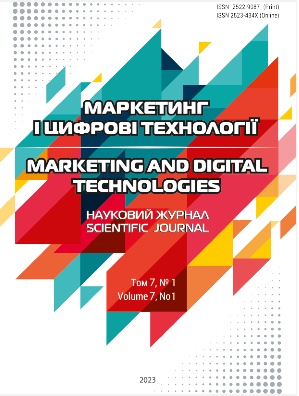Use of Artificial Intelligence for Marketing
Abstract
The aim of the article is to investigate the opportunities of artificial intelligence in planning business processes in marketing and assess the impact of artificial intelligence in forecasting real marketing situations.
Results analysis. The use of artificial intelligence in the marketing activities of trade enterprises is an effective tool and demand of the time. In the conditions of uncertainty and social challenges for business, it is the digitalization and technologization of product promotion processes that give an opportunity to preserve and develop it. The article examines the features of using artificial intelligence technology in marketing activities. The development of artificial intelligence technology is changing traditional marketing methods, increasing the effectiveness of modern marketing and reducing marketing costs. The study of the use of artificial intelligence technology to build a new marketing model of influence on the consumer is an important vector of marketing development, which will allow marketers to attract customers more effectively and determine their needs more accurately. Artificial intelligence makes it easier to work with databases to find potential customers, satisfy their needs and establish a good relationship between marketers and consumers. For example, the system can predict how certain changes in marketing campaigns might affect sales and profits. Other useful functions of artificial intelligence systems for marketing include the analysis of the effectiveness of marketing campaigns, the identification of new potential markets and the analysis of the competitive situation. In the course of the study, the stages of introducing artificial intelligence into the activities of trade enterprises, its advantages and efficiency in making management decisions are determined. The advantages of using artificial intelligence in SEO and SMM are determined. The significance of the synthesis of artificial intelligence and cognitive marketing is substantiated.
Conclusions and directions for further research. Research results indicate that the introduction of artificial intelligence is an effective tool for the enterprise marketing activities, which expands the possibilities of demand forecasting, inventory management, and increases business profitability. Predicting changes in customer behavior is an indispensable function of artificial intelligence. Systems can analyze data about customers and their buying habits and predict how they will respond to certain marketing efforts. The application of artificial intelligence and cognitive marketing can help to understand and satisfy the needs of customers, allowing retailers to increase the effectiveness of marketing campaigns and make them more successful. Based on the conclusions about the effectiveness of the use of artificial intelligence in marketing activities of trade enterprises, the prospects for further scientific research will be the study of the relationship between cognitive marketing and artificial intelligence, which can help understand and satisfy the needs of buyers, and make marketing campaigns more successful.
Keywords: artificial intelligence, artificial intelligence tools, marketing, cognitive marketing, digitalization of marketing, SEO, SMM, globalization.
DOI: 10.15276/mdt.7.2.2023.3
- Tartachnyi O. (2022) Shtuchnyi intelekt nareshti pronykaie u biznes [Artificial Intelligence Finally Penetrating into Business]. Speka. Available at: https://speka.media/stucnii-intelekt-naresti-pronikaje-u-biznes-the-economist-9xx2z9 (accessed 01 March 2023). (in Ukrainian).
- Longoni, C., & Cian, L. (2022). Artificial Intelligence in Utilitarian vs. Hedonic Contexts: The “Word-of-machine” Effect. Journal of Marketing, vol. 86(1), pp. 91-108. (in English).
- Garvey, A. M., Kim, T., & Duhachek, A. (2023). Bad News? Send an AI. Good News? Send a Human. Journal of Marketing, vol. 87(1), pp. 10–25. (in English).
- De Bruyn, A., Viswanathan, V., Beh, Y. S., Brock, J. K. U., & Von Wangenheim, F. (2020). Artificial Intelligence and Marketing: Pitfalls and Opportunities. Journal of Interactive Marketing, vol. 51(1), pp. 91-105. (in English).
- Markets of Tomorrow Report 2023: Turning Technologies into New Sources of Global Growth. Insig HT Report January 2023. World Economic Forum. Available at: https://www3.weforum.org/docs/WEF_Markets_of_Tomorrow_2023.pdf (accessed 17 March 2023). (in English).
- AI in Digital Marketing – a Super-hot Trend in 2023. Available at: https://ad-maven.com/ai-in-digital-marketing-a-super-hot-trend-in-2023/ (accessed 17 March 2023). (in English).
- Proskurnina, N.V. (2020) Shtuchnyi intelekt u marketynhovii diialnosti [Artificial Intelligence in Marketing Activities] Zovnishnia torhivlia: ekonomika, finansy, pravo, vol. 4, pp. 129-140. (in Ukrainian).
- Shtuchnyi intelekt u biznesi ta marketynhu (2022) [Artificial Intelligence in Business and Marketing]. Gerabot. Available at: https://gerabot.com/article/shtuchnii_intelekt_u_webi_ta_marketingu (accessed 17 March 2023). (in Ukrainian).
- Stebliuk, N.F, & Kopieikina, Ye.V. (2019) Tekhnolohii shtuchnoho intelektu v marketynhu [Technologies of Artificial Intelligence in Marketing]. Pryazovskyi ekonomichnyi visnyk, vol. 3 (14), pp. 462-466. (in Ukrainian).
- Artificial Intelligence (AI) Marketing Benchmark Report:2023. Influencer MarketingHub. Available at: https://influencermarketinghub.com/ai-marketing-benchmark-report/ (accessed 17 March 2023). (in English).
- Dernova, I.A., & Borovyk, T.M., (2022) Tsyfrovizatsiia ekonomiky Ukrainy v umovakh pandemii: tendentsii ta napriamy rozvytku [Digitalization of Ukraine’s Economy in Pandemic Conditions: Trends and Directions of Development]. Ekonomika: realii chasu, vol. 1, pp. 22-29. (in Ukrainian).
- Pashkuda, T.V., & Afendi, A. I. (2022) Napriamy rozvytku torhivli v Ukraini v umovakh voiennoho stanu [Directions of Trade Development in Ukraine under the Conditions of Martial Law]. Ekonomika ta suspilstvo, vol. 43. Available at: https://economyandsociety.in.ua/index.php/journal/ article/view/1759/1695 (accessed 17 March 2023). (in Ukrainian).
- Retail E-commerce Sales Worldwide from 2014-2023. Statista. Available at: https://www.statista.com/statistics/379046/worldwide-retail-e-commerce-sales/#statisticContainer (accessed 20 March 2023). (in English).
- Ivanova, I.V., Borovyk, T.M., Rudenko, A.Yu., & Zalozna, T.H. (2020) Black Friday аs а Tool for Sales Promotion. Marketynh i tsyfrovi tekhnolohii, vol. 4, pp. 52-61. (in English).
- Khromiak, Yo. Ya., Sliusarchuk, Yu. M., Tsymbal, L. L., & Tsymbal, V. M. (2013). Kohnityvni tekhnolohii ta yikh osoblyvosti u menedzhmenti y marketynhu [Cognitive Technologies and Their Features in Management and Marketing]. Visnyk Natsionalnoho universytetu Lvivska politekhnika. Menedzhment ta pidpryiemnytstvo v Ukraini: etapy stanovlennia i problemy rozvytku, vol. 767, pp. 75-82. (in Ukrainian).
-
pdf_3 (Українська)
downloaded:




